In January 2019, Vivekananda International Foundation organized the seminar Vasudhaiva Kutumbakam: Relevance of India’s Ancient Thinking to Contemporary Strategic Reality to mobilize the Indian repository of ideas—ancient and modern—and bring them to practical and strategic use in building an Indian narrative in today’s world order. This is a flagship series of conferences instituted by the VIF. The second edition of the Vasudhaiva Kutumbakam seminar this year was held on 3rd and 4th March and it was titled Vasudhaiva Kutumbakam Revisited: Exploring India’s Soft Power Assets. As the title suggests, the focus this year was on India’s soft power assets and the role India is set out to play in the Asian 21st century.
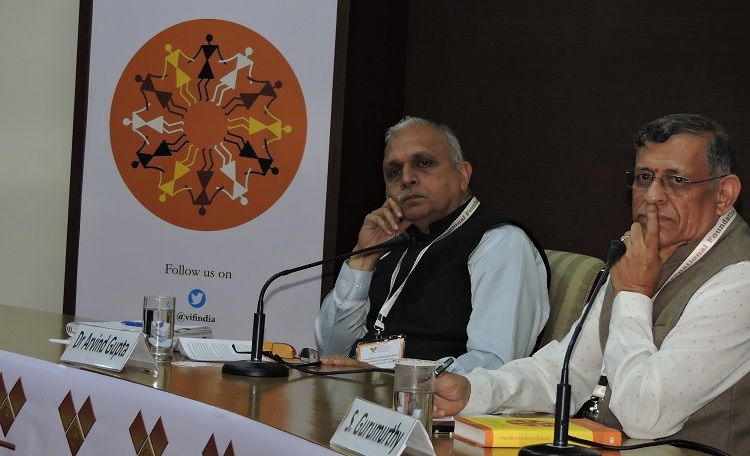
Dr. Arvind Gupta, Director, VIF gave the Welcome Address and Shri S. Gurumurthy, Chairman, VIF, gave the Keynote Address. As last year, this year too, Shri Gurumurthy emphasized on the point that Vasudhaiva Kutumbakam has to be a reciprocal principle—it is impossible to practice this ideal with those who do not reciprocate its spirit. He also pointed out that such an ideal is part and parcel of a particular worldview. A maxim such as atithi devo bhava (a guest is god—atithi is a person who arrives as a guest without a prior appointment) was part of the same worldview. He recounted that this maxim was still a living practice even in his childhood: before having her afternoon meal, his mother used to wait for any unexpected guests to arrive. There were days when no guests came, yet she kept on waiting without partaking of her meal. Then the neighbours had to come and present themselves as guests so that the family could have its meal!
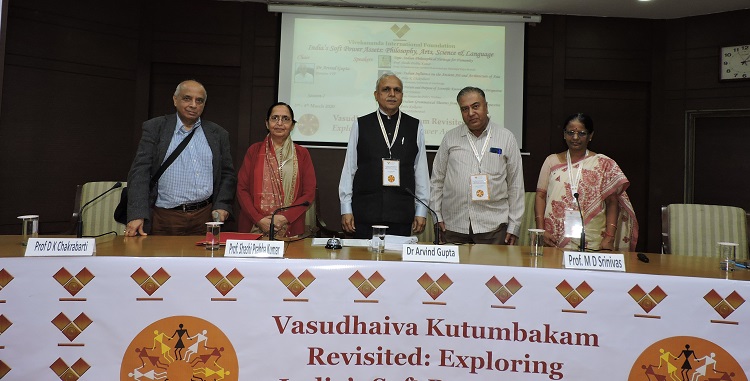
The first session of the seminar was devoted to an exploration of India’s soft power assets beyond the so-called assets “Yoga, Bollywood, Ayurveda and cuisine”. While speaking about India’s philosophical contribution to humanity, Prof. Shashi Prabha Kumar mentioned about the Rig Vedic aphorism manurbhava (Be a human-being) which indicates that being born as a human is not enough, one has to become a human-being. The difference between manushya (human) and pashu (animal) is that human beings think, contemplate (manana means contemplation), while animals are focused on sense perception (pashyati iti pashu – the one who sees with the help of eyes is animal). Prof. Dilip Chakrabarti spoke about the influence of Indian art and sculpture on the architecture in South East Asia and West Asia. Prof. M D Srinivas highlighted the difference between the Western paradigm of science and the ancient Indian one—the chief difference being that the former has been more absolutist while the latter more open-ended. Furthermore, the West has used scientific knowledge to control and exploit nature. Prof. Amba Kulkarni explained why Panini’s grammar is said to contain the germ of modern computational systems. Written in the style of an algorithm, Panini’s grammars, as well as other Indian traditional grammars have been the basis of developing some modern-day computational systems.
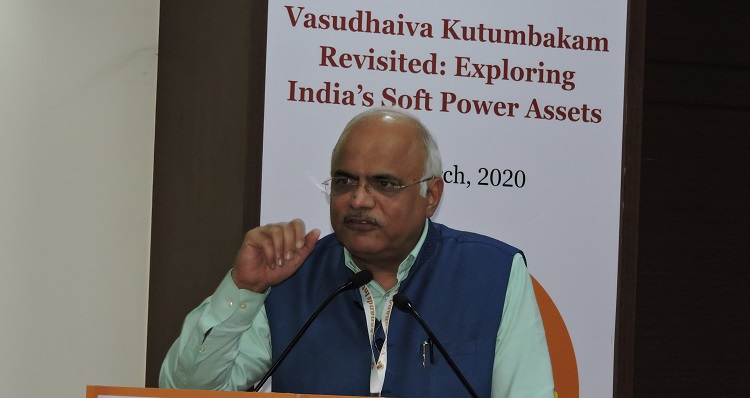
In the afternoon session, Dr. Vinay Sahasrabuddhe addressed the gathering as the Guest of Honour. He highlighted that Indian people are the bearers of India’s soft power. The second session of the seminar focused on another wealth of India—religious pluralism and diversity. Prof. Jeffery Long argued that the ideal of pluralism has been a prominent feature of discourse on religious diversity in India and that such ideas do matter. He said that India has produced numerous philosophical approaches to the diversity of views and practices, which, if implemented on a global scale, have the potential of mitigating conflict and promoting mutual understanding. Swami Narasimhananda highlighted that Swami Vivekananda had envisaged a religion that would not be limited by the constraints of place and time and would include all the features of the faith-systems that are prevalent till now and would have space for accommodating all religious ideas that would come in the future. Swami Narasimhananda likened this with cloud computing where data is stored and can be used and modified by anyone irrespective of place and time of that person.
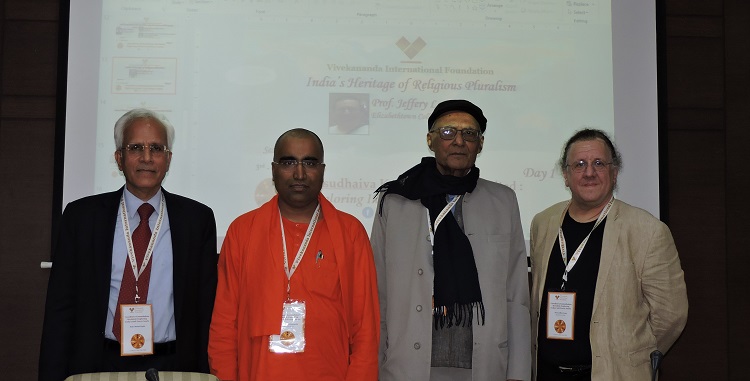
The last session on 3rd March was a special brainstorming session on Hindu Studies Abroad: Problems and Prospects. In recent times, concern has been raised over how Hinduism is studied in universities abroad and how it is portrayed generally in international academic circles. The aim of this session was to discuss the problems in this area and what we can do for a more objective process to take place. Prof. Arvind Sharma gave a special address on the subject, which was followed by a brainstorming discussion by Ambassador Basant Gupta, Prof. Jeffery Long and Swami Narasimhananda.
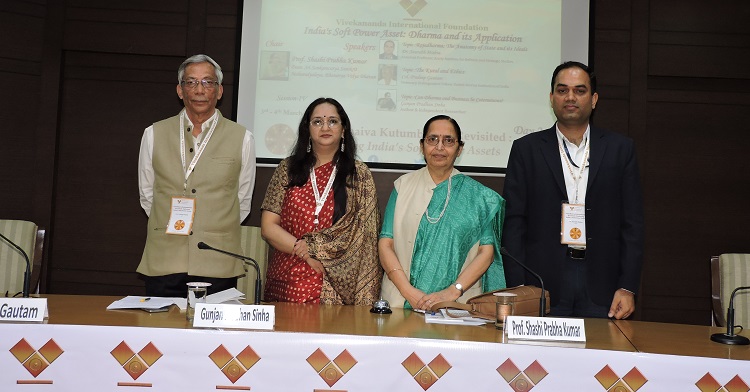
The first session of day two of the seminar was on Dharma and the difficulties associated with its application. Dharma has been a much misunderstood word in the Anglophone world. There are various shades of meanings associated with it and the most predominant meaning comes closest to the concept of ‘duty’ or righteousness. Dr. Saurabh Mishra explained the Indian idea of Rajadharma and concluded by saying that it is the classic apad-dharma (duty pertaining to exceptional or emergency times, hence duty that can violate some principles of dharma in order to protect higher principles). Rajadharma involves the use of force (violence being a violation of dharma) precisely for the preservation of peace and order. Col. Pradeep Gautam presented on ethics in the Thirukkural, a text much neglected today but a highly influential and important civilizational text of India. Gunjan Pradhan Sinha argued in her presentation that business and dharma cannot be mutually opposing if one follows the true definition of business as something that sustains and is sustainable (as opposed to a mere transaction in the economy).
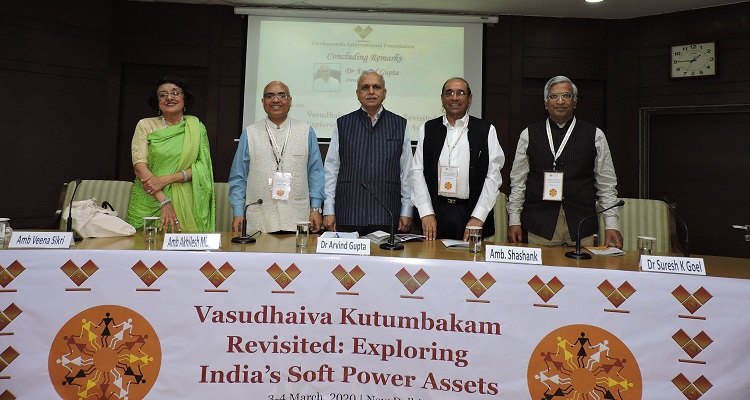
The last session of the seminar was yet another brainstorming session on India’s soft power projection. Eminent diplomats (former and present) participated in it to make it a stimulating debate. Ambassador Shashank reminded us that along with soft power, we cannot afford to ignore our hard power exercise as well. Ambassador Veena Sikri reiterated that the Ministry of External Affairs first needs to recognize soft power as a diplomatic asset. Dr. Suresh Goel talked to developing Indian Chairs abroad for strengthening people-to-people contact. Ambassador Akhilesh Mishra also participated in the discussion in his individual capacity. He was the one to question the validity of Nye’s concept of soft power in the Indian context, because India’s end can never be what Nye had suggested—to get others to want what one wants. He instead proposed the term India’s ‘instruments of influence’.
Some of the recommendations that came up in the course of the seminar were:
- Sanskrit should be introduced in the curriculum. Without a mandatory knowledge of Sanskrit, we are importing opinions about Indian culture from abroad instead of producing home-grown knowledge of Indian culture.
- Bhagavad Gita should also be studied as part of the curriculum.
- Hindu Studies and Comparative Religion departments need to be opened in the universities in order to dispel ignorance and lack of understanding of these subjects.
- The upshot of the above-mentioned three recommendations is that we have to take hold of the production of knowledge on Indian history and culture.
- The MEA should consider introducing positions like Research Fellow in Archaeology in countries like Afghanistan and others with whom we have shared close ties documented vividly in archaeological remains. The purpose of these Research Fellows would be the document existing material and undertake new research on India’s pre-modern ties with other parts of the world.


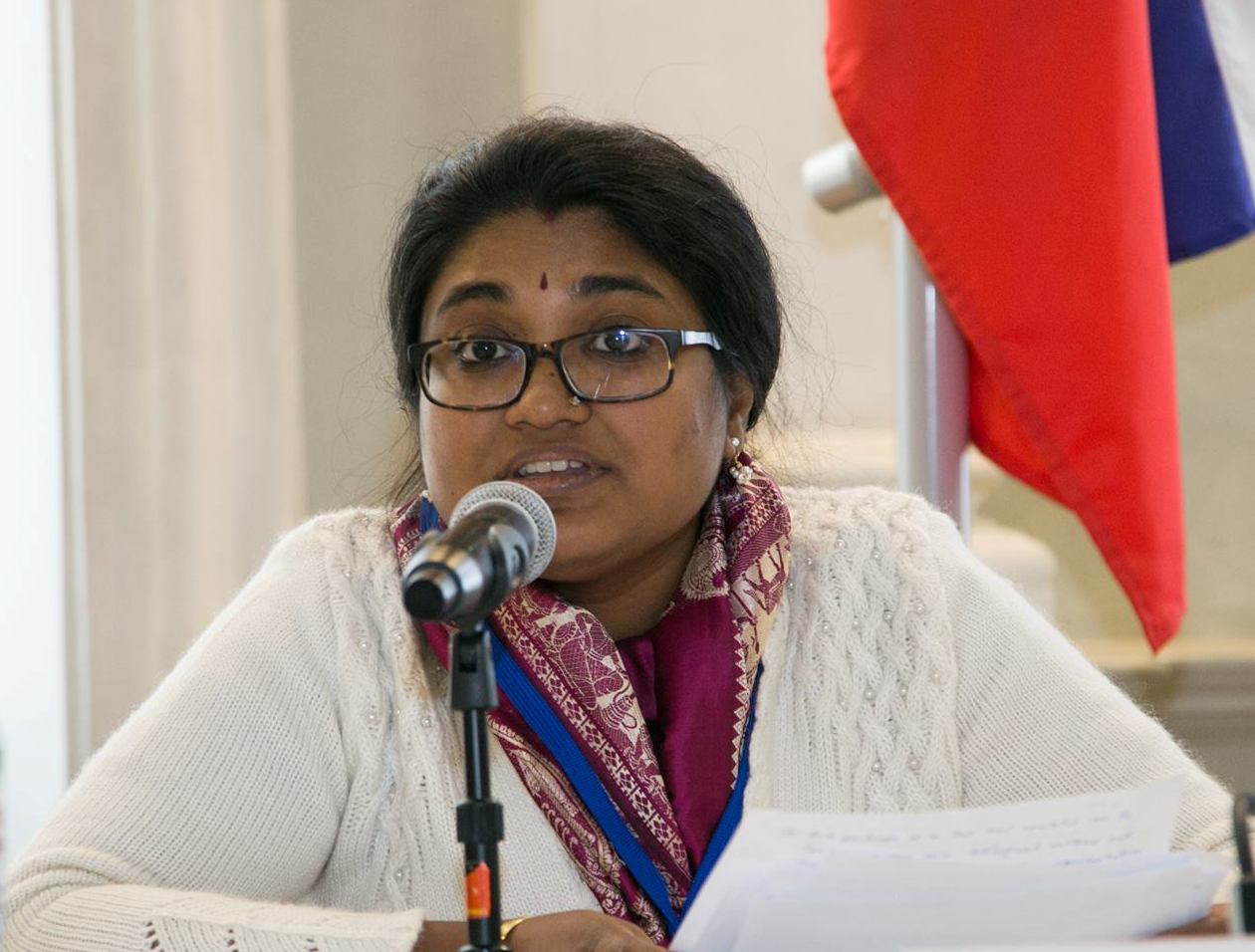




Post new comment